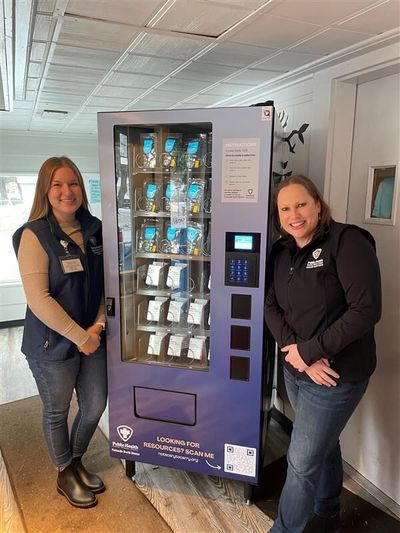Opioid overdose reversal drug Narcan is now available for free in two vending machines provided by the north Idaho Panhandle Health District

Placed inside two vending machines in North Idaho, free Narcan is now available to combat opioid overdoses.
Despite being approved for over-the-counter use by the FDA earlier this year, the life-saving drug can cost approximately $50, depending upon the pharmacy. The Panhandle Health District plans to counteract that barrier by providing Narcan for free in a vending machine.
“Overdoses can happen to anyone,” Panhandle Health District community health program manager Katie Schmeer said in a statement. “That is why it is so important to provide access to anyone who would like this life-saving measure.”
The machines were paid for with settlement money from a lawsuit against opioid makers and distributors. The two vending machines are in Coeur d’Alene and Kellogg. One is located at the Pantry at St. Vincent de Paul at 1317 N. First St. in Coeur d’Alene, and the other is at Shoshone County Fire District No. 2 at 911 Bunker Ave. in Kellogg
These two locations were chosen based on accessibility and on data indicating Kootenai County and Shoshone County experienced more overdoses than the rest of the health district’s five-county service area in North Idaho.
“We felt there was a need to be met in these general locations,” Panhandle Health District spokesperson Katherine Hoyer said.
There is not a vending machine equivalent in Spokane, according to the Spokane Regional Health District. But the agency also provides Narcan and training on how to use it.
Narcan rapidly reverses an opioid overdose and brings back normal breathing. Though it can also be injected, the Narcan in the vending machines is in a nasal spray form. In addition to the drug, the machine provides pouches that can dispose the medication safely.
“When used as instructed, the pouches deactivate medication and allow the public to dispose of their unused medication in the trash,” Hoyer said.
Instructions on how to administer Narcan are available on the medication packaging. The drug does not harm a person if they are not experiencing an opioid overdose.
The machine will only provide the Narcan once per transaction and will deny access to the drug if there are “excessive repeated requests in a short period of time,” according to Hoyer, who said the Health District does not expect tampering.
Rather than only for those experiencing drug addiction, Hoyer recommends that everyone carry Narcan so it is hand when a friend, loved one or stranger needs it. Both Idaho and Washington have a “good Samaritan” law allowing regular citizens to administer Narcan without any legal liability.
“Narcan is easy to use and could be the difference between a fatal overdose and a life being saved,” she said.